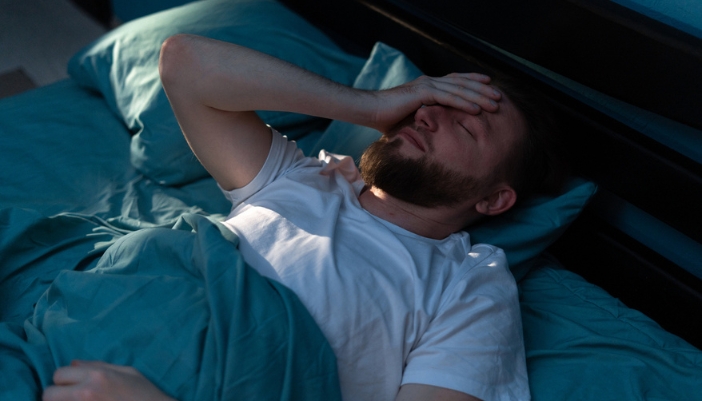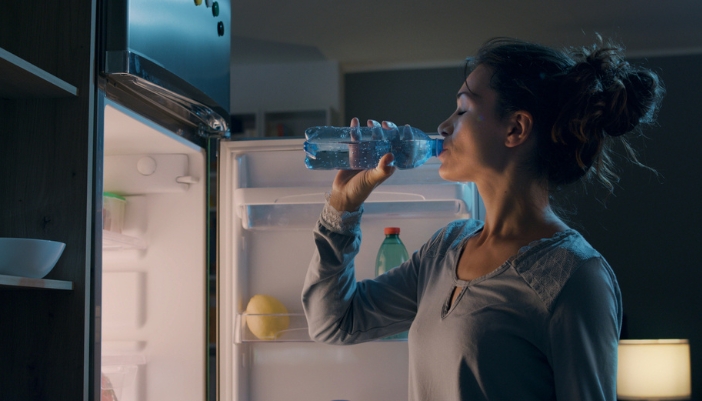You drink plenty of water, do all the right things before bed, and still wake up hot, groggy, and somehow...thirsty? It’s easy to blame stress or hormones, but the problem might be a little more unexpected: your mattress.
No, your bed isn’t secretly stealing your hydration, but it can mess with how your body holds onto it. Some mattresses create a warm, stuffy sleep environment that leads to more overnight sweating and less efficient cooling. So even if you're staying hydrated during the day, your sleep setup could still be working against you.
If that sounds familiar, you're not alone. Our experts at Rice’s Appliance & Bedding Center can help you figure out what's throwing your nights off and guide you toward sleep solutions that support comfort, cooling, and hydration—together.
Disclaimer: The information on this site is not intended or implied to be a substitute for professional medical advice, diagnosis, or treatment. If you suffer from any symptoms or diagnoses we discuss, please consult your physician prior to making any decisions.

Why Hydration Matters for Sleep
You can do everything “right” before bed—no screens, calm routine, blackout curtains—and still wake up feeling like a human toaster oven. The problem might not be your habits—it might be your hydration!
Even mild dehydration can affect your body’s ability to stay cool, relaxed, and fully rested. When that balance is off, sleep tends to unravel in a few pretty frustrating ways:
- Raises your core body temperature: Less water means your body struggles to cool itself down, which is essential for falling and staying asleep.
- Increases nighttime wake-ups: Your brain senses imbalance and can trigger more disruptions throughout your sleep cycle.
- Causes dry mouth or sore throat: Not exactly the gentle wake-up call we’re hoping for.
- Leads to leg cramps and muscle tension: Especially during REM sleep when muscles should be relaxing.
- Triggers snoring or breathing issues: Dry airways = more snore-fests (and less deep sleep).
Pro Tip:
If you’re waking up groggy or thirsty—even after drinking water during the day—your body might be working overtime at night to stay balanced. That’s a hydration red flag, not just “bad sleep.”

How Mattress Materials Impact Hydration + Sleep
Even if you’re fully hydrated at bedtime, your mattress can still throw things off—especially if it traps heat like it’s prepping you for a slow roast. Turns out, what you sleep on plays a big role in how your body holds onto moisture and manages temperature through the night.
Some materials help your body stay cool and balanced through the night—but others? They basically do the opposite.
Let’s start with the troublemakers:
- Dense memory foam: Great for pressure relief, but tends to trap heat and restrict airflow unless it’s infused with cooling gel or tech.
- Traditional polyurethane foam: It tends to insulate well, which is the opposite of what hot sleepers need.
- Vinyl or plastic-based mattress covers: Often found in budget or waterproof models, these trap heat and prevent moisture from evaporating.
Now, here’s what actually helps you sleep cooler and stay more hydrated overnight:
- Natural latex: Open-cell structure allows air to flow and helps regulate body temp. Also naturally resistant to mold and bacteria.
- Hybrid mattresses: Coil layers improve airflow and reduce heat buildup, especially when paired with breathable comfort layers.
- Cooling fabric covers (like Tencel, bamboo, or phase-change materials): These wick moisture away and feel cool to the touch, helping maintain skin-level comfort.

Signs Your Mattress Might Be Working Against You
Your body’s not subtle—it tries to tell you when something’s off. And when it comes to sleep, those little signs you brush off (or blame on stress, aging, or the dog hogging the covers) might be pointing to your mattress.
The tricky part? These issues don’t always scream “bad mattress.” But they can quietly add up, especially when heat and hydration are part of the equation.
Pay attention if you notice things like:
- You wake up sweaty, even when your room isn’t hot. Your mattress could be trapping heat and not letting it escape.
- You toss and turn, trying to get comfortable. Constant fidgeting can be your body’s way of saying it can’t cool down or breathe properly.
- You wake up with a dry mouth or need to chug water first thing. This could be dehydration from overnight fluid loss, often made worse by heat-retaining materials.
- You keep kicking off the covers mid-sleep. Your body’s trying to regulate its temperature, and your mattress isn’t making it easy.
- You feel groggy even after a full night’s sleep. Overheating can prevent your body from reaching deep, restorative stages of sleep.
How to Choose a Mattress That Supports Hydration + Cooling
Your mattress could be the missing link if you’ve ruled out hydration habits but still wake up too warm or dried out. The fix? Choosing materials that work with your body overnight. And this isn’t just about avoiding bad materials—it’s about knowing what features and designs make a difference in the long run.
When mattress shopping (or upgrading your setup), here’s what to look for:
- Built-in airflow: Look for hybrid mattresses with coils or ventilated foam layers. The more room for air to move, the better.
- Cooling textiles: Covers made with bamboo, Tencel, or phase-change fabrics help control moisture and feel cooler against the skin.
- Responsive materials: Latex and open-cell foams bounce back quickly and don’t trap heat like traditional memory foam.
- Customizable layers: Some brands let you adjust firmness or cooling zones, which is great if your sleep issues are more about hot spots than full-body heat.
- Add-ons that make a real difference: Moisture-wicking mattress protectors, breathable toppers, or even just upgrading your sheets can help if a new mattress isn’t in the budget.

Other Tips to Stay Cool and Hydrated at Night
Even with the right mattress, your nighttime habits play a big role in how well your body stays balanced. Think of your sleep setup and your routine as a team—when one’s off, the other has to work harder.
If your mattress is doing its part, but you’re still waking up hot or dehydrated, a few small tweaks might help fill the gaps:
- Sip water consistently throughout the day: Front-load your hydration so you’re not chugging a full glass right before bed.
- Watch the alcohol and caffeine: Both are dehydrating, especially in the hours before sleep.
- Use a fan or adjust the room temperature: 60–67°F is the sweet spot for most people. Cooler air helps regulate body temperature and reduce sweating.
- Choose breathable bedding: Natural fibers like cotton, linen, or bamboo allow for better airflow and moisture control.
- Take a warm (not hot) shower before bed: It helps your body cool down afterward, which makes falling asleep easier.
- Keep a glass of water nearby (just in case): You don’t want to break a good sleep cycle to go searching for hydration.
Pro Tip:
If you’re waking up to use the bathroom more than once a night, you might be overcorrecting on hydration timing. Try shifting most of your water intake to earlier in the day.
Your Mattress Shouldn’t Be Making You Thirsty
Sleep shouldn’t feel like a nightly survival challenge. If you’re doing your best to stay hydrated but still waking up feeling like a baked potato, something’s off—and your mattress might be part of the problem.
The good news? You don’t have to sweat it alone. (Literally.) Our team at Rice’s Appliance & Bedding Center is here to help you find a mattress that works with your body, not against it. If you’ve got questions, we’ve got answers—and a showroom full of options you can test out in person!


